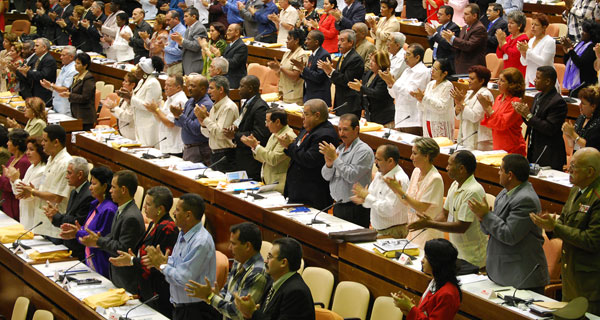Several times the President Raúl Castro has criticized the false unanimity, but if someone has the undisputed record in this regard is the Cuban Parliament: able to legislate for almost 4 decades without ever a congressman voted against.
There are 600 men and women around the country, from different social classes, from twenty somethings to grandparents in retirement age, they play different topics of national life and curiously always end up being all agreed.
It would be a rarity anywhere in the world but, knowing the soul of the controversial Cuban here could be described as a miracle.
The problem is that many do it just believe and suspect that something fishy.
It could be a useful instrument to govern centrally and pass laws by the National Assembly as a mere formality but if it is to institutionalize the country, parliament should be one of the first places to turn.

Cuban Deputies clapping during one of its two annual meetings. (Photo: Raquel Perez)
The deputies were elected by the people and uphold the interests of their constituents. It would help turn things around, no longer be considered government officials in their communities and act as representatives of their people to the central power.
Reports to Parliament by the ministers or the president just pick up the applause of the deputies. But this is not a popularity contest but to lead a nation in need of critical minds to correct its course permanently.
The legislative inaction Cuba is such that instead of being a country of laws has become a state of “resolutions”, “circular” and “decrees” issued by government officials and sometimes conflict with the law and even the Constitution.
I have not heard that one deputy in parliament have protested the ban unconstitutional enter hotels or a representative of the eastern provinces to discuss the restrictions imposed on their constituents to migrate to the capital.
Is to institutionalize the house in order for everyone to do what it deserves within the powers granted them by law. The main task of a parliament is to legislate, in addition to exercise, on behalf of citizens, control over the executive.
Little of that happens now and hardly transform the parliament as long as directed in the same way it has been. In this sense, the generational change that is already rumored could facilitate change within the institution.
They will also need a different mentality in the Communist Party, whose members cover 90% of parliamentary seats. These men and women can not fully exercise their role as Members while they are subject to party discipline.
Democratic centralism gives the Communists the opportunity to discuss internally but then forces them to support the majority decision. So I find it almost impossible to question in Parliament to a minister member of the leadership of the CPC.
Nobody believes that, as in other countries, the deputies occupy the office to enrich himself, but that does not mean that they enjoy high prestige among Cubans, few have the hope that “his representative” will solve the problems of the community.
To change that perception parliament need a living, look at the reality with a critical eye, to remain vigilant against the central power, not subject to public debate and national interest as the synthesis of the various local interests represented by deputies.
The task is not easy but is essential at a time of transformations that require change not only the laws but to the Constitution. Many say the reforms are moving forward slowly but the truth is that neither the parliament and does achieve.
You may not depend on them the adoption of a new immigration law but is not approved the Family Code to regulate the rights of children, the elderly and the LGBT community despite already have 5 years “debating”.
The announcement of the meeting of parliament next day 23 got me thinking on the potential, capabilities and potential of grassroots deputies. I know some and I know they are good people, decent, dedicated and intelligent.
Obviously they are not the problem but a model of government, mechanisms and a mindset that prevent them from acting as representatives of their communities and play well the role that they really would play in a country institutionalized.
Sources: FernandoRavsberg / BBC / UK / RaquelPerezPhoto / TheCubanHistory.com
CartasDesdeCuba / The Cuban History / Arnoldo Varona, Publisher



 Unanimity vs. Institutionality Letters From Cuba (07/05/2012)
Unanimity vs. Institutionality Letters From Cuba (07/05/2012)